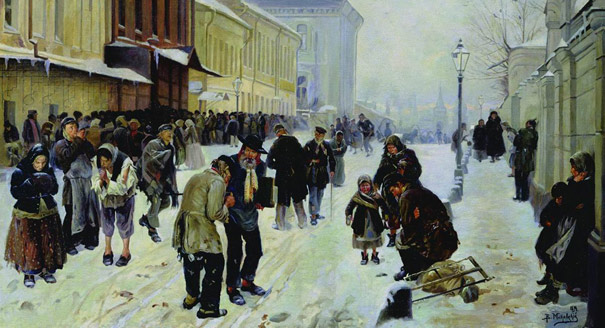A look at mainstream media headlines in Russia shows that while the Kremlin expends significant energy in promoting its national security and foreign policy agenda, it is almost completely oblivious to social issues. Indeed, in Russia, the mainstream media mainly focus on three areas: the president and, to a lesser extent, his cabinet; military and diplomatic conflicts abroad; and the lack of alternatives to the current regime. These three pillars have defined the Kremlin’s information policy for the past six years.
Missing from this list is the government’s social policy, something the mainstream media once vigorously defended during Vladimir Putin’s first two presidential terms. Discussion of social policy gave way to the promotion of innovation and modernization under President Dmitry Medvedev before disappearing from the headlines entirely following the annexation of Crimea, which unleashed a wave of euphoria that sustained the regime for several years. It allowed the Kremlin to maintain a high approval rating while neglecting social issues amid unfavorable economic conditions.
As post-Crimea euphoria has receded, causing the public to shift its attention from the television to the refrigerator, the issues of social injustice and declining standards of living have come to the fore. The Kremlin has opted against actively addressing social issues and ceased to manage its coverage in the mainstream media, bringing about what is best described as an informational free-for-all.
Those who believe that Russia’s government exerts total control over the press will be surprised to learn how social issues are now covered in the mainstream media. Amid painful and highly unpopular economic choices—from raising retirement ages to increasing the VAT—the mainstream media’s news reports on the subject have come to resemble the blog posts of Alexei Navalny and the pamphlets of the radical left.
The last few years have witnessed the transformation of the way in which Russia’s regime legitimates itself. Upon assuming the presidency, Putin based his rule on a social contract that promised Russians income growth and action on social issues. It enabled him to adopt reforms that virtually eliminated the oligarchs of the 1990s, as well as opposition from regional governors, and produced the famous power vertical.
As Russia’s new political elites assumed key positions in the system, the social contract was gradually amended in their favor. In his third presidential term, Putin drifted away from the people, focusing instead on protecting his inner circle. That process is now complete, with the government openly telling the people that “the state doesn’t owe you anything,” in the words of Olga Glatskikh, a Sverdlovsk regional government official.
This evolution has led to two practical consequences. First, the Kremlin has lost all interest in managing the mainstream media’s coverage of social issues, inadvertently affording the press unprecedented freedom in reporting on the subject. As a result, even pro-government news outlets have taken to covering social issues with an eye to increasing their readership. Hence the flood of alarmist headlines on social issues, which are grounded in fact yet seem unnaturally critical by Russian media standards.
Second, government officials’ priorities have changed. The interests of voters have taken a back seat to those of their Kremlin superiors. With resources dwindling, government officials have abandoned political correctness. As they attempt to sell deeply unpopular changes to ordinary Russians, whose opinion of the government has long since ceased to determine whether it remains in power, they sound more like accountants than servants of the people.
Indeed, Medvedev’s infamous phrase—“there’s no money, but hang in there”—is increasingly echoed at various levels of government. United Russia lawmaker Ekaterina Lakhova has recommended that Russians experiment with a “wartime diet” rather than ask the government for greater handouts, while State Duma speaker Vyacheslav Volodin has defended raising retirement ages by warning that things may worsen further and implying that pensions may be abolished altogether.
In Russia, the political survival of a government official depends on the answer to the following question: “What is Putin going to say?” The president does not care about petty social issues when there are greater matters at stake, from geopolitics to the lofty goals stated in the May Edict. Inventing accomplishments in defiance of the facts on the ground, bureaucrats fiddle with official data to suit their own needs.
Meanwhile, with Putin’s approval rating at pre-Crimea levels and the Kremlin recovering from embarrassing defeats in recent gubernatorial elections, the Kremlin is choosing to draw on its ample resources to manage political risks instead of addressing social issues. For the Kremlin, the only challenges worth dealing with are critics like Navalny, who has been repeatedly arrested; their supporters, who are persecuted after each round of anti-government protests; and the liberal press, like the New Times, which was slapped with an enormous fine after interviewing Navalny. The Kremlin easily overlooks headlines on social issues that fuel the public’s fear and anger, since these are not seen to pose a direct threat to its political survival.
Simply put, the authorities are no longer able to respond to social needs. Nor will Moscow find it easy to restore control over the social agenda, even if it tries to return to it tomorrow. The government has simply forgotten how to empathize with the public and understand its demands, which it increasingly perceives as excessive and politically untenable. To understand the nature of Putin’s fourth presidential term, look to the government’s new maxim: “We don’t owe you anything.”







.jpg)